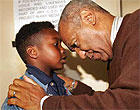After stating four reasons why "Jews revere the university," he counters that with the reality of what universities are actually doing:
Yet universities have become society's primary breeding ground for hatred of Israel. This hatred is often so intense that the college campus has become a haven for people who use anti-Zionism to mask their anti-Semitism. Moreover, anti-Zionism itself is a form of anti-Semitism, even if some Jews share it. Why? Because anti-Zionism is not simply criticism of Israel, which is as legitimate as criticism of any country. Anti-Zionism means that Israel as a Jewish state has no right to exist. And when a person argues that only one country in the world is unworthy of existence — and that happens to be the one Jewish country in the world — one is engaged in anti-Semitism, whether personally anti-Semitic or not.
Not long ago, on my radio show, I invited a UCLA student who, on the occasion of Israel's birthday, had written a hate-filled article about the Jewish state in the Bruin, the school newspaper. I asked her if she had always been anti-Israel. She said that as a Jewish girl growing up in Britain, she was actually a Zionist who had visited Israel a number of times on Jewish student trips there.
"What changed you?" I asked.
"The university," she responded.
That sort of transformation may be what inspired Harvard University's president, Lawrence Summers, to deliver a speech in which he identified the university as replacing the far right as a center of anti-Semitism. "Where anti-Semitism and views that are profoundly anti-Israeli have traditionally been the primary preserve of poorly educated right-wing populists," he warned, "profoundly anti-Israel views are increasingly finding support in progressive intellectual communities. Serious and thoughtful people are advocating and taking actions that are anti-Semitic in their effect if not their intent."
...
To make matters worse for many Jews' psyches, not only has the institution they most revere turned out to be a moral wasteland and the most congenial place for enemies of the Jewish people — and of the United States (but that is another story) — at the same time, the people whom many Jews have most feared, conservative Christians, have turned out to be the Jews' most loyal friends. That the secular university is bad for Jews, and conservative Christians are good for Jews, is more than enough cognitive dissonance for a Jew to experience in a lifetime.
...
Jews for whom liberalism has become a surrogate religion — and who therefore do not wish to acknowledge a god that failed — will not acknowledge the moral failure of the university, and they will find every reason to dismiss support from conservative Christians as somehow illegitimate.
...
As more Jews rethink their commitment to secularism, the left and their embodiment in the university — without abandoning their commitment to the less fortunate — Jewish and American life will change dramatically. For the better.




